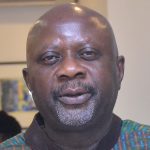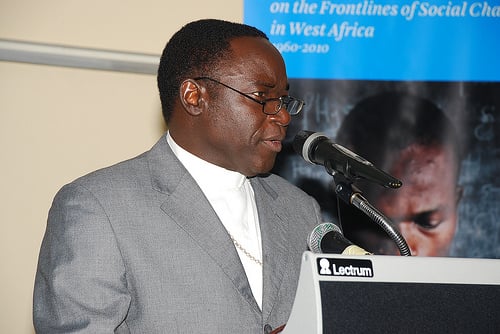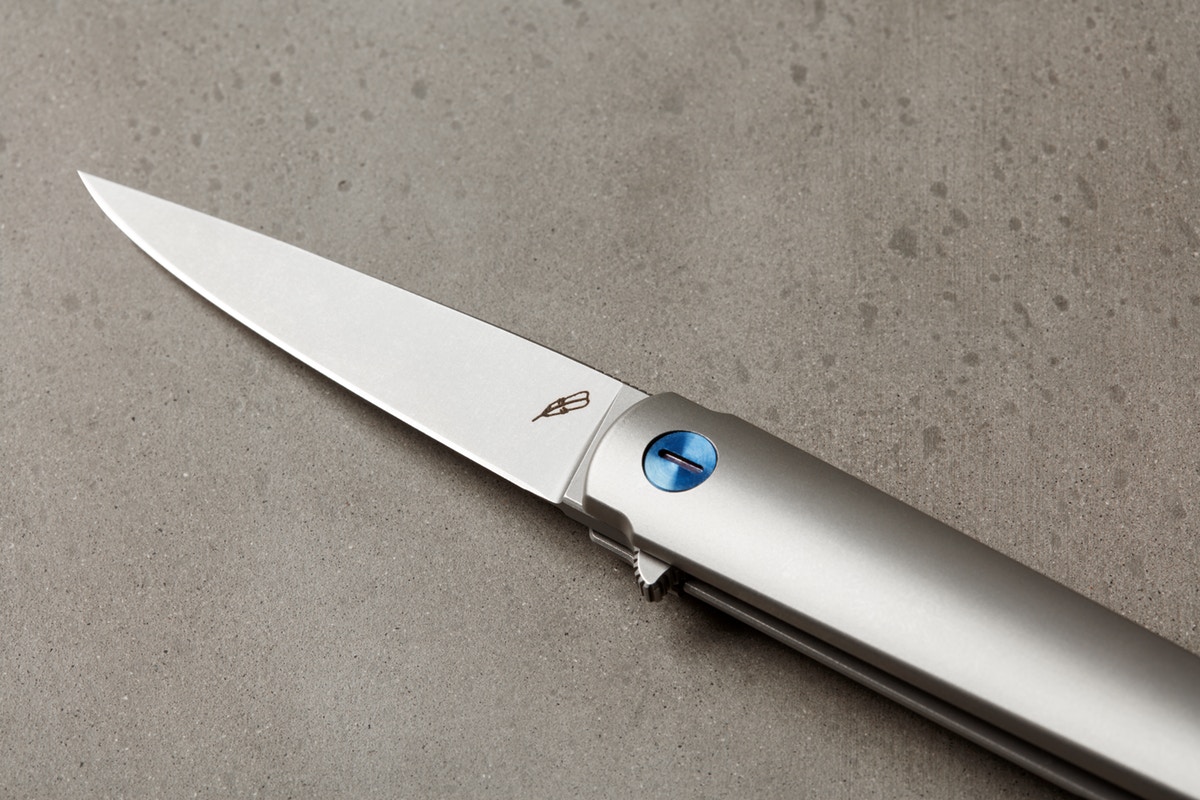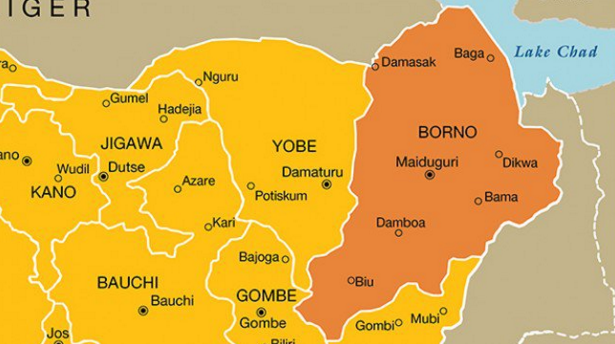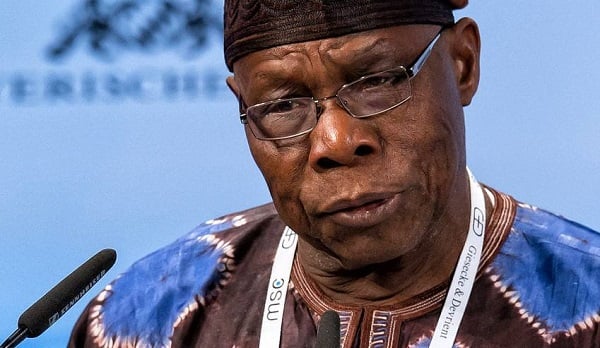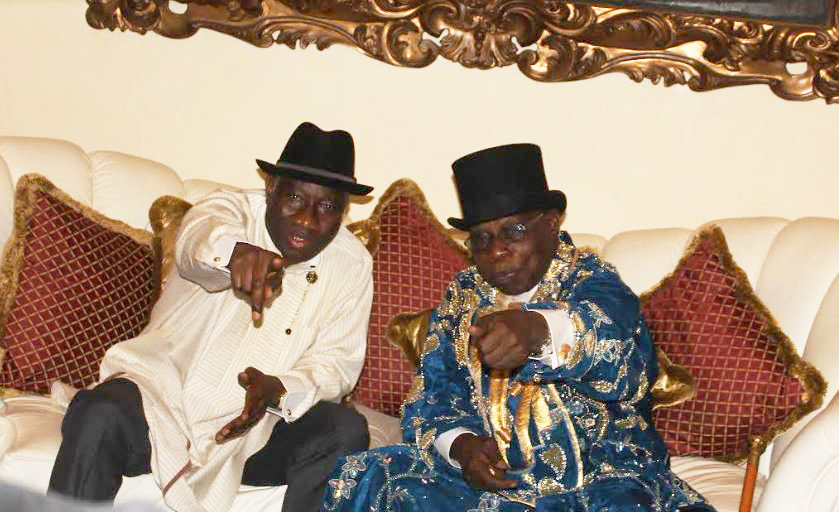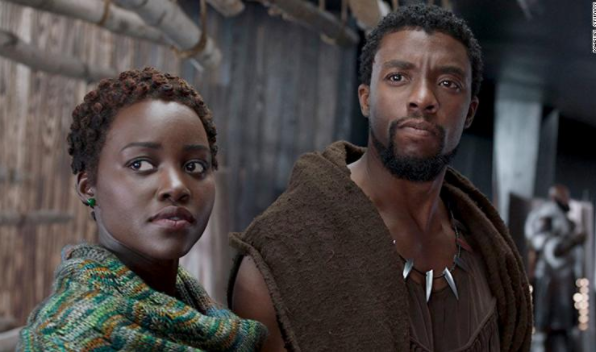For someone whom a significant segment of society holds in high esteem as representing its moral authority and its moral conscience and a public intellectual to boot, one would think that even the mere hinting publicly that the military may be a viable alternative to a civilian and democratic government—-having witnessed the atrocities that are inherent in the military and its repressive approach to governance in his country—-would be the last thing to come into the forefront of Bishop Mathew Hassan Kukah’s consciousness.
The elevation of the military, if not the nostalgia he seems to be having, for its involvement in governance, is the Bishop’s latest prescription for the alleviation of Nigeria’s poor leadership challenge.
In a lecture with the theme: “How to make democracy work for Africa,” organised by the Kukah Centre (his pet project), the Catholic Bishop of Sokoto Arch-Diocese Mathew Kukah was reported to have warned political leaders to “govern well in order to avert any temptation by military to take over governance via coups.” The Bishop was also reported to have “lamented the worsening state of the country from poor leadership” adding that “Nigeria has only survived the democratic dispensation because of the confidence reposed on the system by the military.” Therefore, the country’s leaders should “not take the patience of the military for granted.” Kukah went further to say that “It is a measure of the faith of the military itself on the urgency of democratisation that has kept them in the barracks. But I think the politicians and the political class cannot take this patience for granted. What we have experienced in the last few years has made us a laughing stock of other nations.”
For starters, it was not the first time that Bishop Kukah would ‘shoot’ at Buhari from his bully pulpit. And the latest threatening remarks won’t be his last as long as Buhari remains the country’s Number One citizen. Kukah was among the very first set of prominent Nigerians from the religious class (followed by Cardinal Anthony Olubunmi Okogie) to register his displeasure about Buhari even before the 2015 presidential election. Through speeches and other appearances, he had campaigned, at least indirectly, for then President Jonathan. For inexplicable reason he seemed terrified of Buhari then and appears even more disdainful of him now. After Jonathan’s loss of the election, Kukah quickly formed a group of prominent Nigerians among them Gen. Abdulsalam Abubakar, Nigeria’s last military ruler and gave it a duplicitous name known as the National Peace Council (NPC). As the arrow head of this organization, Bishop Kukah commenced some sort of priesthood diplomacy to the presidential villa after Buhari’s inauguration not to discuss peace or any policy initiatives, but to tell the then president-elect to “move on” and “look the other way” concerning what Jonathan and his administration may have done because the man at the helm of the most fantastically corrupt government in the nation’s history, if not the world, had done something “spectacular”—-a veiled reference that the former president had conceded defeat. Sensing that President Buhari was unyielding in his resolve to wrestle corruption to the ground before it kills the country, Kukah has been taunting him ever since with uncomplimentary remarks.
Advertisement
One would have thought that Bishop Kukah, having sullied his image with uncouth commentaries since the advent of Buhari, would begin to redeem himself and simply let the man be. But his latest elevation of the military as an alternative to what he perceives as the “worsening state of the country from poor leadership” is the probably the most reckless and (I wish there’s a kinder and gentler way to say this) irresponsible commentary to have come from someone of Kukah’s calibre and stature. Kukah is probably too far gone in his disdain of Buhari to even realise the contradiction in his warning to politicians to “not take the patience of the military for granted” when he also mentioned that “democracy requires lots and lots of patience and hardwork.” From the foregoing, on what basis then is the intervention of the military, no matter his so-called “worsening state of the country from poor leadership” desirable? Did the military record any enviable achievements that advanced the country in any way in the seven times that the institution intervened in the country’s governance since flag independence? Has Kukah ever heard of the universal and time-tested truism that the worst civilian, democratic administration is better than the best military government?
So, the question now becomes; if Kukah truly believes that it takes “lots of patience and hardwork” for democracy to germinate, not to talk of having strong roots in a country that has not only been traumatised by the military (of which this trauma remains a major part of the national psyche till date), but also has never had any sustained democracy in her life because the same military had always truncated her democratic aspirations at every turn for its selfish interests, why is the bishop in a hurry to have the military back in governance because he believes that the political class is taking its patience for granted? Does the bishop even realise that the destruction unleashed on Nigeria’s socio-political and economic fabric in the first sixteen years of the present democratic dispensation—-not to talk of decades of plunder to which the military subjected the country—-is so daunting and humongous a task to be ameliorated in four years? Kukah’s thought process cannot get any more bizarre than this.
Kukah’s latest swan song of “poor leadership” he thinks the country have “experienced in the last few years [that has] made us a laughing stock of other nations” could not have been targeted at Obasanjo (who was president for eight years) or Jonathan (who spent 6 years in the saddle) but President Buhari whom he loves to hate. In a more civilized and serious clime, Kukah’s not-so-subtle encouragement to the military to once again consider truncating a democratically elected government—-which borders on treason—-would not only have provoked public anger, but he would by now have been invited by the nation’s security and intelligence agencies for questioning and subsequently put under surveillance. But a deafening silence from the polity, most especially the media, has been the response to this shameless clergy.
Advertisement
Perhaps it is important to ask if Kukah’s reckless statement was just a coincidence or part of a grand plan to stop Buhari’s second term by any means necessary. In less than a month, it is such an irony of history that the two most vilified generals wrote letters in quick succession to President Buhari not to seek re-election. One is therefore curious if Kukah is the head of the religious wing of these generals who may have already taken strategic positions in order to create a critical mass of unsuspecting Nigerians to hound Buhari into submission. And if the president insists on running for re-election—-which he’s most likely to win—-is the military option part of this grand plan? Otherwise, how come Generals Obasanjo and Babangida seem so vehemently opposed to Buhari now even when their contrived “poor leadership” allegation doesn’t hold water?
The irony here is that these high-profile criticisms of Buhari are coming from those who presided over not only criminal enterprises they passed on as governments to the Nigerian people, but also whose accomplishments in their combined sixteen years as presidents pales in comparison to the successes that has so far been recorded by Buhari in less than three years. One then wonders if the Obasanjo, Babangida and Kukah troika are revving up their criticisms to the highest decibel now because they had expected that Buhari would not survive his sickness. But now that he has not only survived but he’s robust, energetic and much healthier looking than before and there are indications he would seek re-election and most probably win, they may have discreetly sworn not to let that happen as long as they’re alive. For the criticisms to be this vehement, Buhari must be doing something very terrible to their core interests that has held the country by the jugular for so long which the Nigerian people are yet to be aware of. Whatever seems to be getting them so irritated of Buhari must, no doubt, be good for the generality of Nigerians as these generals have never cared for the progress and wellbeing of the people whose backs they’re now attempting to ride back into political reckoning once again so that the country’s plunder can continue. They shall fail this time.
Femi Odere is a media practitioner. He can be reached at [email protected]
Advertisement
Add a comment
